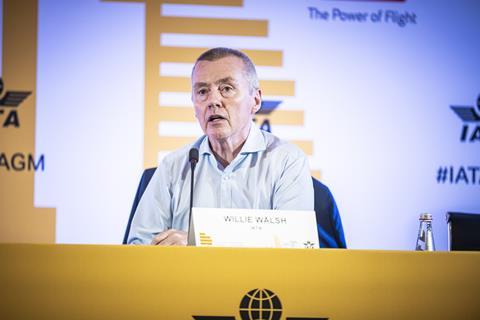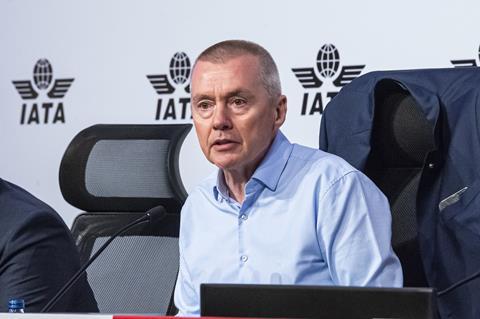Pleased that the industry is finally hitting pre-Covid milestones, IATA chief calls for action on sustainable fuel and taxation
Since last year’s IATA AGM in Istanbul, Willie Walsh has continued to lead industry efforts to ensure governments around the world take a much keener interest in the development of the sustainable aviation fuel (SAF) sector.
A degree of success on that mission provides a positive backdrop for this year’s gathering in Dubai in early June, as the industry grapples with its biggest challenge: achieving net-zero emissions by 2050.
“Every government I speak to, their awareness of the issue of SAF and the importance of SAF is at a completely different level than it was even a year ago, but certainly two-to-three years ago when a lot of countries weren’t really in a position to understand the opportunity that SAF represented,” Walsh tells Airline Business during an interview on the eve of this year’s AGM.
“What we need to see is that awareness turning into action, because the time available to us is short.”

Indeed, as airlines look towards interim 2030 targets for SAF useage, it is crucial that decisions to build production facilities are made quickly, Walsh notes, given it takes years to get a plant up and running.
“That needs to be done now,” he says.
One of Walsh’s key messages to governments equivocating on support for the establishment of SAF production facilities is that the development of a new industry can bring significant economic benefits – benefits that are even available to countries with no history of jet fuel production.
If governments make the right decisions, the industry’s “very credible” path to 2050 will become achievable, he says, preserving the myriad benefits of commercial aviation for more people.
“What we need to see is that awareness turning into action, because the time available to us is short”
Speaking during what is his fourth year as director general of IATA, Walsh is now well-versed in fighting hard for industry causes.
Helpfully, airlines are in a much better place today than they were when Walsh first took on the role at the height of the Covid-19 pandemic.
“I’ve been watching how the market has been improving and getting back to 2019 figures,” he says, noting that traffic and capacity are more or less in line with pre-Covid levels today, with only international travel in Asia-Pacific having ground to make up.
“I think we’re in a good place,” he says of industry health.
“The recovery in 2023 was very positive and we’re continuing on that journey of recovery in 2024,” he adds.
PEAK TRAVEL PERIOD
And for the first time since the pandemic, Walsh is able to express “cautious optimism” about the preparedness of key service providers for the coming northern hemisphere peak travel period.
“Ground handling companies and airports, in the main, look like they’ve got the right resources in place,” he says. “I’m sure there will be challenges, but nothing like we have witnessed previously.”
Still, amid the positive outlook, familiar challenges loom large.
For Walsh, taxation is a topic that never goes away, particularly in the era of so much scrutiny on the industry’s environmental footprint, giving IATA an important role in helping people to understand the impact of any moves to increase that burden.
“We clearly have a job to do to continue to ensure that we make the case for our industry and ensure that any moves that are made by governments are sensible and are positive [so people can] continue to enjoy the benefits of aviation,” he says.
An immediate impact of extra taxation on flying tends to be a reduction in the load factor of aircraft but not necessarily the number of flights, Walsh says.
“They’ll just operate with fewer people occupying the seats on the aircraft, which is totally counterproductive,” he states.
“The recovery in 2023 was very positive and we’re continuing on that journey of recovery in 2024”
Furthermore, taxes are likely to increase inequality in terms of access to commercial air transport, Walsh insists.
“All the analysis we do is that any change in the global tax environment is likely to impact on poorer countries much more than the developed countries, which doesn’t seem like a sensible thing to do.
“Anything that increases taxes typically impacts on poorer people who don’t have the ability to absorb this additional cost and therefore the opportunity just gets removed from them.
“That’s a retrograde step.”
Europe’s lack of progress on implementing the Single European Sky is another issue on which Walsh has strong words – and one on which he will continue to fight, despite many of the bloc’s national governments still rejecting closer airspace integration on the grounds of national security.
“It’s bordering on disgust now that we see governments not prepared to face up to the opportunity that exists to improve the environmental performance,” he says. “So we’re not going to let this one lie.”
Walsh cites estimates that implementation of SES could bring emissions reductions of 10-12%, adding: “It’s too big an issue for us to ignore.”
CAPACITY CAPS
He also takes aim at moves in Europe to cap capacity at some airports – notably Amsterdam Schiphol – contrasting the attitudes of governments in the region with a much more positive outlook elsewhere.
“Europe may take the view that the right thing to do is to start reducing the amount of flying, but places like India, China, Asia, Latin America, Africa, they are looking at the opportunity,” he says, noting that he recently visited India and saw first-hand the ambition on show in its rapidly expanding airline sector.
“There’s no way countries like India will forgo the economic opportunity that aviation represents now. I think they’re all conscious of ensuring that they can get the economic benefit while acknowledging and addressing the environmental impact,” he says.

Walsh believes some governments and regulators in Europe might live to regret any moves to restrict the airline sector’s expansion.
“I think the political debate is arrogant because there’s this sense that everybody must do what Europe is doing,” Walsh states.
“But Europe has had massive economic benefit from aviation and connectivity; I think it’s been the success of the EU.
“They [cannot] retain all of that economic benefit while at the same time trying to suppress flying,” he says.
While it grapples with those issues, the industry is also looking to the future with its profitability still on a knife edge, giving IATA all the more reason to resist any additional tax burden or moves to cap its flying.
“There is a long way to go in terms of what would be considered an acceptable level of profitability,” Walsh says. “Margins are still very, very slim both at an operating and a net margin level.”
Fuel costs, and specifically the wide crack spread – the difference in price between crude oil and jet fuel – are a particular concern for IATA when assessing barriers to boosting profitability.
The crack spread has been averaging around 30% over the past three months, Walsh says, compared with an industry average of 17% between 2010 and 2019. The lack of knowledge of that dynamic can make it hard for consumers to understand why fares have risen, he notes.
“We’ve seen a significant widening in the crack spread that isn’t fully appreciated by others,” he says. “When you consider fuel inflation, for airlines it’s been significantly greater than consumer price inflation as a result of the changes in the oil price and the petrol price that people have seen.
“Margins are still very, very slim both at an operating and a net margin level”
“That’s been a challenge for everybody and it impacts every airline around the world.”
Airlines also continue to face challenges securing timely MRO services and the parts needed to keep aircraft in the air, Walsh says.
“What most people are saying to me now is that it’s not getting worse,” he explains. “It’s potentially stabilised – stabilised in a bad place.”
With no end in sight, airlines are now factoring related delays into the planning cycle, Walsh says.
“They’re expecting this supply chain issue to continue.”
Aircraft delivery delays are also a headache for an industry that already lost out on four years of growth because of the pandemic.
Walsh acknowledges that delivery delays are not a new thing, but says the current levels “are unprecedented” and that uncertainty – which has been evident this year with many airlines having to rethink close-in capacity plans due to late-arriving jets – is the biggest concern.
“Most airlines would have planned the delivery of new aircraft to coincide with the increase in demand so that you’re taking in new capacity at a time when demand is increasing, and of course you put all of your planning in place to ensure that you’ve got pilots trained up to fly these aircraft, and that’s probably the most expensive part of that process.”
But as with MRO and parts issues, there is no end in sight to the delivery delays this year.
“That’s playing into expansion plans or capacity plans airlines will have for this year and probably even next year,” Walsh says.
Four years into his role with IATA, Walsh has plenty to keep him busy, even with the industry moving on to more stable post-pandemic foundations.
AI’S TRANSFORMATIVE POTENTIAL
The growth of artificial intelligence has been a big talking point over the past couple of years across global economies – a discussion that will continue on stage this week in Dubai.
Walsh acknowledges that AI is already used in the industry in areas such as predictive maintenance and says that it has “huge, huge potential” to be transformative, even if he is unsure at this stage whether it will turn out to be a “net positive or a net negative”.
He cites areas such as identifying “pinch points” in operations as having growth potential when it comes to AI, among many uses that might ultimately lead to customers receiving “a better quality of service” and airlines being able to “better anticipate what people want”.
Walsh cautions, however, that it is still unclear where the risks might lie in the use of AI, explaining: “I hope we’re not the last generation who will be able to look at something on the computer screen and say ‘no, that doesn’t make sense’… still using our brains to try and figure out what the right answer is.”
The key, he suggests, is that airlines use AI “to augment our ability… to improve the situation rather than just being told that that’s the answer”.
INDUSTRY MAKES PROGRESS ON DIVERSITY
IATA has taken a key role in industry efforts to increase gender diversity among its workforce, particularly in the C-suite, with what Willie Walsh describes as positive results, even if there is still a long way to go.
“We’re making very good progress,” he states. “You’ve seen some very high-profile female CEOs appointed and it’s in every part of the world, which is great.”
Among those chief executives, RwandAir’s Yvonne Makolo has spent the past year as the first woman to chair IATA’s board of governors. Reflecting the industry’s historical record on gender diversity, she was also the 81st person to take that role.
“It’s easy for me to say and I’m sure if… it was a woman sitting here, they’d say not enough progress [has been made] and it’s far too slow,” Walsh continues. “But from an industry point of view I look at the progress we’ve made in the last five years and it is noticeable.”
